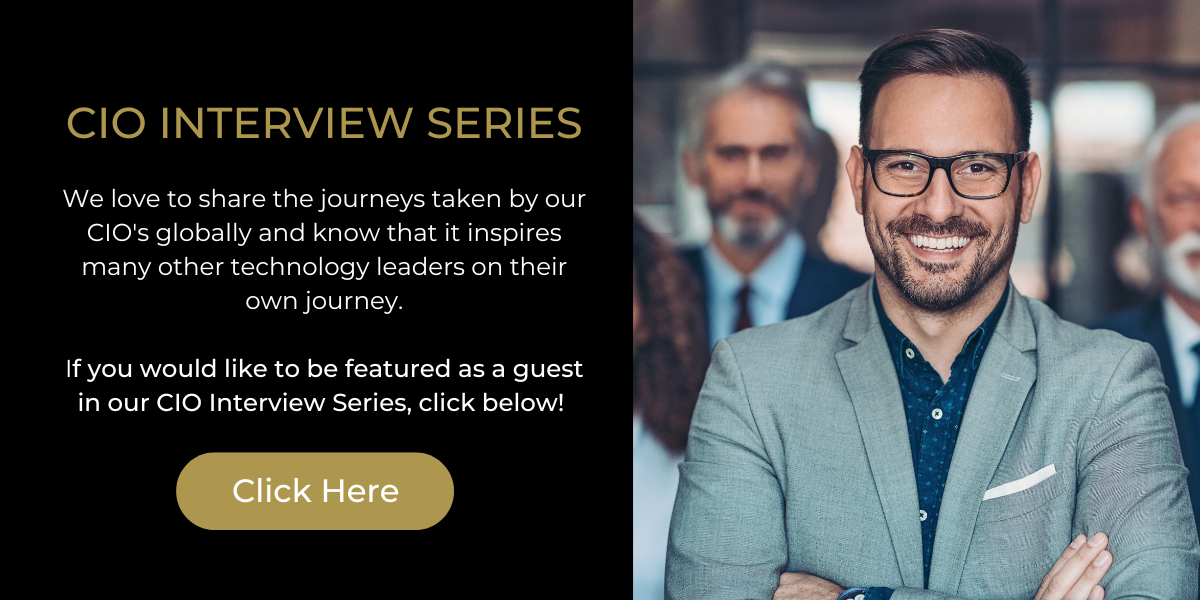CIO at AIM IT Consulting
Can you please provide a little introduction about yourself
I am a retired combat veteran living in Milwaukee, WI with my wife and children. We have 6 children altogether, but half are already out on their own.
I currently work full time as an IT Infrastructure Project Manager for the USDA, part time consultant for Kohl’s Department Store, and part time CIO for AIM IT Consulting. AIM IT is a company that a long-time friend and former Army buddy, Jonathan Moore, started based out of Indianapolis, IN. After shutting down my own Cyber Risk Management consulting firm, I joined my friend to help with his new startup.
I recently finished my bachelor’s degree in Cybersecurity and will be starting a master’s program in Cybersecurity in two months.
What path have you taken to your current position?
The journey has been awesome! Nothing ever goes how you would like, but I feel that in the end it builds character and I still ended up exactly where I wanted to be. The Army helped to prepare me for the trying and difficult times. I started in IT at the age of 16 as a summer intern at a local bank. After high school I joined the Army which I spent 20 years working in many different technical and leadership roles.
After retirement, I served in various positions throughout the Department of Defense (DoD) as a contractor and civilian government employee supporting agencies such as the National Security Agency (NSA), Federal Bureau of Investigations (FBI), Defense Information Systems Agency (DISA), Defense Cyber Crime Center (DC3), Marine Corp Cyberspace Warfare Group (MCCYWG) and many others.
My journey was long, partly due to being in the Army for so long, but I also slow rolled quite a bit after retirement to just catch up on life. 20 years, 13 countries, 7 states, and a lot of miscalculation, but I made it. The transition from the Army back to civilian life was the most difficult time of my life, and it took a lot to adjust.
Has it always been your vision to reach the position you’re at? Was your current role part of your vision to become a tech leader?
I never had a real end goal, but I always strived to be the best at whatever I was doing at the time. It wasn’t until over the past 2-3 years that I became fixated on becoming a CIO.
In the Army as a leader, half of my day was spent being a technician and the other half was spent leading Soldiers. I always loved both aspects, but at one point I felt as though I had reached my potential as a technician and started to lean towards “switching sides, so to speak”.
Once I made the decision of working towards becoming a CIO, I chose my current role with the USDA to rehone my project management and leadership skills.
Have you had a role model or mentor that has helped you on your journey?
I have had more than I can remember! I am the type of person that will take the good from someone, but also learn from the bad. Throughout my 28 years in IT, I can say that I picked something up from every single supervisor and colleague that I have worked with. I have had quite a few formal mentors and role models that even at this point I still lean on. Some I have known for over 25 years. They raised me in this IT World!
To name a few, there was Angel Montero who was my very first supervisor in the Army. He taught me that the basics always matter, which is why he had me making straight through and cross over cables day in and day out. I haven’t made one in 15 years, but I am still capable of making a perfect cable on the fly! This carried over into my days of instructing, and always will be the first step in troubleshooting a networking issue.
Then there was Bryan Billups and Randy Brown who showed me a few very effective ways of leading during a time of madness. 9/11 was a real game changer for me! They were my first- and second-line supervisors during my first deployment to the Middle East. The decision-making skills that I acquired during that time have carried me a long way. The kind of pressure that comes with making quick, life-or-death decisions can break even the best of us.
I can’t leave out my good friend Don Courts, who like me is from the Midwest, but he joined the Air Force and eventually started multiple companies, and not all in IT. He was a civilian while I was still a Soldier, but to see how he juggled work as an IT Program Manager, spending quality family time, standing up his own businesses, and attending school to get his MBA was an eye opener. I was always pretty good at my job, but to see one man do all of that truly inspired me.
I must mention Josh Nehring, who was my first supervisor at the USDA. Josh is such a compassionate and down to earth guy. When I started working for Josh, it was a true culture shock. Josh is just a different type of guy. The Army hardened me a lot and it took a lot to let some of that go. This was something I felt that I needed to work on, and meeting Josh help to get me past that hurdle.
Most recently is my wife. She inspired me to go back to school. At the age of 45 she decided that she wants to be a Forensic Psychologist. To see her put so much effort into her school, and to hear her ask me why I don’t also go back to school is what got me to register. I had already made it this far without a degree and if I want to be a CIO of a major corporation, I probably need some sort of degree.
There are so many more that I can mention, but everyone has been very important to my journey.
How do you see the role of the technology leader evolving over the next 5 years?
The boundaries between traditional IT leadership roles like CIO, CTO, and IT Director are blurring. These positions are evolving to meet the ever-changing demands of technology, with some organizations even splitting the responsibilities of the CIO role into two categories. Transformational and Operational. Some may say that Transformational CIO is just another way of saying CTO, and it may very well be.
The Traditional CIO in the past was usually focused on managing IT infrastructure, but today’s CIO must be able to do much more. A CIO today must be a great business enabler and possess the ability to make strategic data-driven decisions. The tech leader doesn’t have to be technical at all anymore. I see so many that have moved into a CIO or CTO role based off business experience alone.
But I must say that non-technical CIOs bring a valuable perspective, prioritizing business needs over the intricacies of specific technologies. For these reasons, the roles and titles are interchangeable and often one person will hold more than one seat at the table.
What skills do you think leaders of the future will need in order to thrive?
I believe that soft skills are and will continue to be at the top of the list. The world is changing, and things like good customer service is needed more than ever. There is so much competition out there and as I learned many years ago, the small things really matter and are significant to the success of anything.
Another critical soft skill is people management, particularly “people picking” skills. I have always felt that picking the right people for the right reason is a huge key to success. Hard skills can be taught, but it’s hard to teach compassion or the ability to read potential.
Is there anything in particular that you would still like to achieve in your career or what is the next step on your journey?
I am always reading or watching something. I read daily and weekly newsletters, watch YouTube, Udemy, LinkedIn Learning, Federal News Network, Cybersecurity Dive, ISACA daily blogs, and The CIO circle just to name a few. As a veteran, the VA and other organizations often offer some sort of free training which I take full advantage of.
I recently finished a program through the VA that provided me with training at Intellectual Point IT Training Academy. The pathway that I chose this time was Artificial Intelligence/Machine Learning. It was 6 months long with classes on Splunk, UiPath, Linux, Python, Security+ and NVIDIA AI in the Data Center. I chose the AI pathway to get some exposure to AI and machine learning. Being a technician at heart coupled with being an IT leader, I felt that I should have some sort of exposure to it, especially with both having such a huge presence in today’s world of IT.
I still work on skills that I no longer use though. They often come in handy when providing guidance and direction on tough issues.
What advice would you give to aspiring technology leaders who are just starting their careers?
AI and machine learning is the next leap in technology. If you’re a leader and don’t know, your people-picking skills better be good to hire people who do know.
"No one role is more valuable than the other."
What has been the biggest challenge you've faced in your career so far, and how did you overcome it?
I would tell them to never turn down an opportunity to learn something, even if it’s just to pop your head in a random office and ask the person what they do. This will help you understand what impact your IT lead services have on the organization.
I would also tell them that everyone in the organization is part of the team. No one role is more valuable than the other. Everyone depends on everyone else for something. Each position is vital. Even if you don’t need that particular person, you will need someone for each and every task.
What role do you see emerging technologies (e.g., AI, machine learning, blockchain) playing in your industry, and how are you preparing for them?
The only two things on my radar right now are finishing my Masters in Cybersecurity and obtaining an MBA. As a veteran who joined from the state of Wisconsin, tuition is free, and UW-Madison has a top ranked business program. Why not?!?
How do you measure and communicate the value and impact of technology initiatives to other business leaders and stakeholders?
A big thank you to Jason Polk from AIM IT Consulting for sharing his journey to date.
If you would like to gain more perspective from Tech Leaders and CIOs you can read some of our other interviews here.
January 6, 2025


